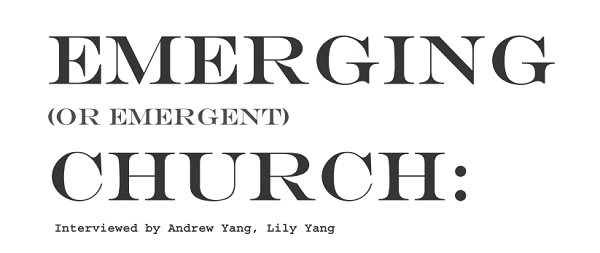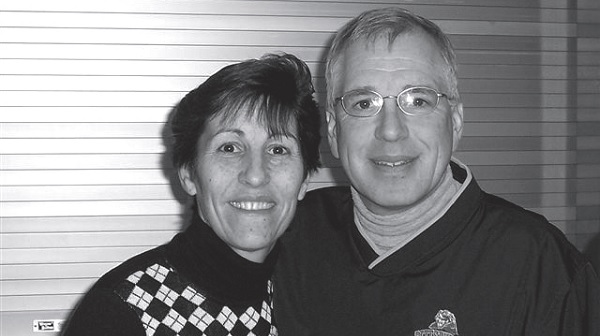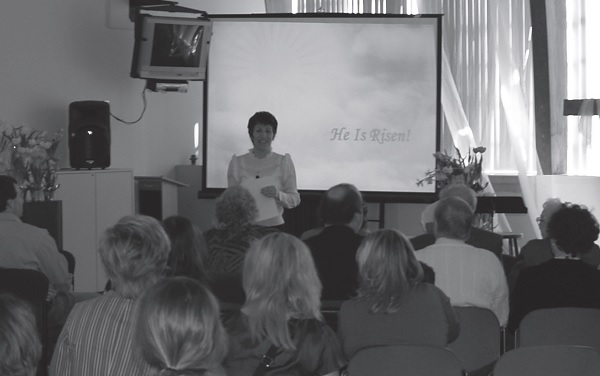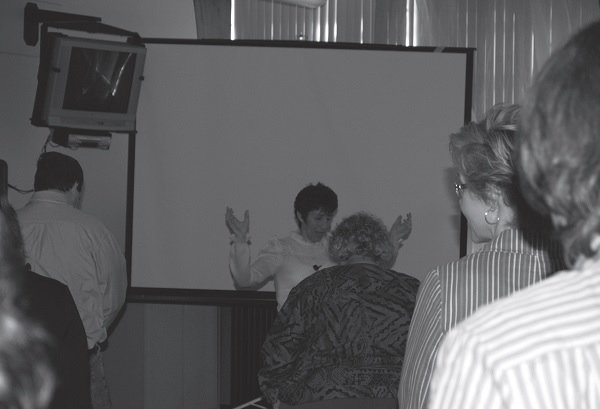Emerging (or Emergent) Church
Interview by Andrew Yang and Lily Yang

Pastor Sue Yoder received her M. Div and D. Min from Pittsburgh Theological Seminary and went on to work as a pastor in three different Presbyterian churches in the Lehigh Valley area. But like many pastors today, she began to sense that times were changing, and set out to find a new way of doing church.

Then she started the Barn.
The Barn is not a cult. Let’s get that straightened out right away, although perhaps the fact that some people have quite seriously asked, “is the Barn a cult?” is a sign of its success in stripping away the familiar labels and trappings traditionally associated with churches.
If you were to attend “the Gathering” – a worship service at the Barn – you might, among many other possibilities, see an interpretive dance, watch a video, participate in a meditative reading of the Lord’s Prayer, or play with a ball of clay. You might also find yourself conversing with an atheist, an ex-Catholic, an evangelical, or, just as likely, someone who doesn’t seem to fit in anywhere.
Pastor Yoder sat down with us to talk about this struggle for a new way of doing church in the post-modern era.
Were you consciously following any model when you started the Barn?
I had read Rob Bell’s book Velvet Elvis and I had read Brian MacLaren’s Generous Orthodoxy, and More Ready Than You Realize and I had read a number of reports and statistics and I had done in my doctoral work generational theory and a study on different generations to know what some of the issues were and I had done quite a bit of reading on postmodernism.
Was there anything that you were able to model the community itself on or –
There weren’t.
There weren’t?
For instance, this is how fast this has changed, when we did our first hire there were no applicants. A year later, there was one applicant. The third year, when we did the hire, we had tons of applicants. I must have gone through fifty some applications for that one music/arts position. This has been the rapid progression of a movement. In the beginning I thought I was the only one out there doing this and then I discovered, wait, Bell’s done something like this, and then I read MacLaren and discovered he was on the same page as some of the stuff that had been rattling around in my head.
So when you started this church, there wasn’t this “emergent” label in your mind, you started to just bump into the same idea as you went along?
Yes, and then those of us who were kind of thinking outside of the box and thinking about a new way of doing life together in Christian community and those of us who were starting to raise some very significant issues with the traditional church in America, all of a sudden started to find each other. I realized it was so much bigger than me, none of us knew, but God was doing a new thing. But when I first started this I didn’t have any role models, I just knew that God was saying “Quit praying for somebody to do something. You’re that somebody, now get off your butt and go do it.”

The Barn is structured to be a safe place to explore belief, but a lot of people would be worried about wrong belief. How do you manage to both make it a safe place to explore and still say what’s right and wrong?
I think it would be fair to say that as a community we would say right relationships supersede right orthodoxy. So how we treat one another is more important as a Jesus follower than being right. So if you believe very strongly X, as guided by scripture and I read the same passage and I believe that the text reads Y, at the Barn we would suggest that how we engage each other in that conversation is more important than that X or Y reigns supreme.
So I’m teaching Orthodoxy, but what I’m saying to people is, if you don’t get to this point where you believe this as it’s been understood by the fathers and mothers of our tradition, that doesn’t mean you’re not welcome in fellowship with us. Come onboard, and keep up the discussion, keep asking the questions, keep in dialogue with us. That’s what I mean by how the relationship is more important than the right orthodoxy.
What else makes the Barn different from other churches?
It’s not just along theological lines, if you explore most communities of faith today, most not all, almost everybody in there looks the same, acts the same, dresses the same… we work really hard not to do that. We have huge economic diversity, we have huge educational diversity, we have huge theological diversity, so what we’re doing is taking people who are very different from one another – it’s easier to love somebody who’s the same as you, and when I’m in the Barn, everybody’s different from me. For some reason we have been brought up to fear difference and I think God is saying “I made you different, this is in your DNA, not to be the same. Learn how to celebrate it instead of pushing away everything that’s not like you.” And I think the Barn is doing that in really cool ways, when you walk in there and all of a sudden none of those differences matter because the only thing that really matters is that we are trying to love and serve Jesus Christ and it doesn’t matter if we’re unemployed and uneducated and a former druggie, or the CEO of a company and a multimillionaire.
I think how I‘ve grown most at the Barn is by hearing the diversity, by living the diversity, by engaging the diversity. When I hear “in our tradition we didn’t do it that way,” and I ask “well tell us how you did it,” then all of a sudden we’re made richer and our view of God becomes bigger instead of narrower. We don’t have to all think the same way about God, and God’s okay with that – we’re the ones who are uncomfortable with that.
But with the differences in belief, what are the truths being emphasized? Are there any?
Well you’re going back to the basic tenets, and I think where the major rub would come would be the question of what the basic tenets are. Let me say first of all I don’t speak for all emergent churches, I’m just an emergent church, and one of the things that emergent churches really resist is being labeled together as a group. So that’s important to say that because the very thing that is crucifying the evangelical church is that they’re arguing even within themselves as to what’s orthodox. And the emergent church is trying to get away from that, because they see the harm and damage that has been caused.
So I think it would be fair to say – and I’m really speaking for the Barn right now, not for emergent communities – that the significance and importance that the conservative evangelical church has put on “these are the things you must believe” and “these things are right and these things are true”, I would say a significant part of those in the emergent movement grew up in that. They know it, they understand it, and they’re rebelling against it. I’m not saying it’s easy for the evangelical church to hear, but I’m saying that it’s that very way of thinking that is causing post-moderns to say, “If this is what it means to be a Christian, that I can’t argue, that I can’t think for myself, if it means that I can’t be a Christian without agreeing to everything that you tell me, then I don’t want to be a Christian in that sense of the word Christian.”
And that is very painful for evangelicals to hear but I think it’s something they must hear. So to say to a post-modern “here’re the facts; believe them or forget it” is to say to the post-modern “don’t think.” But the post-moderns say, “I’m going to think, and if your God isn’t big enough that I can think out loud and ask questions and raise doubts, then I don’t want any part of your God.” But I think God is big enough to entertain that dialogue and I think Christendom is big enough that we can ask how we got to where we are and admit that we’re human, and maybe we don’t have it 100% perfectly down. The Crusades, the Klu Klux Klan, were mistakes made in the name of Christ, and the church even used to say slavery was a good thing. I think we have to own up that we got some things wrong and we need to be always open, in good evangelical form, to the leading of the Holy Spirit. So maybe in this day and this era we have to go back to the Scriptures, look at them through a postmodern lens, and say in light of where we are and what we know we need to be open to hearing God’s voice through the scripture, but at the same time be challenged from the culture to the scripture, and I’m not afraid of that. So am I going to say here are 10 things you have to agree with? I’ll say no, and I may be considered heretical by some conservative evangelicals.

There’s definitely a shift in the thinking process in this generation, and, it’s a little hard to articulate.
It’s hard to articulate because we’ve been taught certain things and we’ve been taught not to challenge them. But you have post-moderns who are taught to challenge everything, they’re taught to not really believe anything as true until they’ve challenged it, thought about it, turned it upside down, shaken it up and everything else. So in some ways I love working with post-moderns because it’s totally refreshing. The questions that they come up with and the things that they say so unnerve me because I think, “That is so cool, I never thought about that before.”
So you don’t see postmodernism as a threat, you see it as an opportunity?
Absolutely.
But many evangelicals think and see it as a threat and try to resist it.
We have a challenge before us. We can either be defeated by that challenge or see it as an opportunity. And from my perspective we’re turning over, as the scriptures tell us to, all that we’ve learned to the next generation. We want to give them the best of what we’ve learned, but we can’t write off the way this generation thinks.
They’re asking questions and they’re owning up to faith in a way my generation never did. We were told, “Here’s what you believe, believe it.” This generation says, “Why should I believe it?” They’re owning it in a way that people from my generation never owned it, and because we didn’t own it, we didn’t do a very good job passing it on to our kids. So we have this whole generation of kids who are growing up in this country not having gone to church, not having been taught principles, but still they’re spiritual beings and they’re asking all the right questions.
So the question to me is, are we going to have a relevant answer for them or are we just going to tell them “Don’t ask those stupid questions, just believe what I tell you and shut up”? That’s not going to be enough for them. I mean, Jesus loved when people brought questions to him, look at the Scripture, they’d ask him a question, he’d ask them back a question. Because he wanted them to own it, he wanted them to understand it. Jesus didn’t just answer their theological questions; he’d ask them another question that would make them think deeply about what they believe. Well I think we’ve lost that art in a large way. The Barn is all about dialogue and asking questions and trying in this wonderful cacophony to put these things together so we can say, “Yeah, that’s why I believe what I believe,” so that I own it, so that it’s deep within my soul, because when I really own it is when I’ll really live it.
Do you have any words for pastors who are struggling with this new challenge?
For me, something I remind myself is to never give up hope. I never give up hope on the next generation, or anyone that I’m working with. Hold fast to hope, because I think it’s central to our faith and who we are. And rather than judging people who are different from you, or the next generation, or post-moderns, or the emergent church, rather than judging them and going into it with a pre-conceived notion, try to learn what’s being said. Read, talk, hang out with characters, people who are different from you, post-moderns – rather than going in with an agenda to convert or get them on the right path. Just listen. And listen carefully, because there is something that God is doing in this generation, that God is doing in the church, right now, and you don’t want to miss it. And it may mean you have to give up something that you value, but you’re giving it up for something that you value more. I gave up the robe, I gave up the title, I gave up the prestige, but I gave it up because I wanted to reach out to people who were being forgotten, and in fact I have been so wonderfully embraced, surprised, changed, and remolded because I was open to the leading of the Holy Spirit. Instead of going in with my agenda, I went in open to what God might do and how God might change me. God has changed me a lot, and I don’t think that’s a bad thing, I think we’re to be moldable in the hands of God.
The other thing is we’ve been taught to see things from one perspective, and I think we need to reclaim the Jewish understanding of who God is. They saw God as a gem, and they believed that if you saw God as that gem, every time you turned that gem and the light hit the gem differently it revealed something more beautiful than the view that you just had. So they always saw what they yet not know, but they weren’t frustrated by that. Instead, they would say, “Look at all that God has yet to reveal to us!”
The more I hang with post-moderns, and the unchurched, and the disappointed with the church instead of staying in my secure glass world, the more I go into the world, the more I realize how rich God is and how broad his love is. So my view of God doesn’t get narrower, it expands and I feel like God has made me so much richer through this experience rather than narrowing me and keeping me protected in my glass house. Now I can go to those places and think, “God can handle this. I may not handle it very well but God can handle this diversity, he can handle this degree of theological continuum, God can challenge me way beyond where I am.” So for me it’s this huge adventure, it’s this really fun ride. I think if you’re a clergyperson who is stuck or doesn’t know where to go or where to turn you have to get ready for the roller-coaster ride and quit thinking it’s this nice, secure merry-go-round, because it’s not. It’s like the wild ride and that’s what we’ve been called to. And we can’t be afraid to go on the wild ride.

